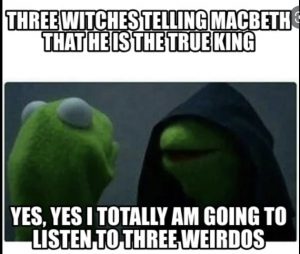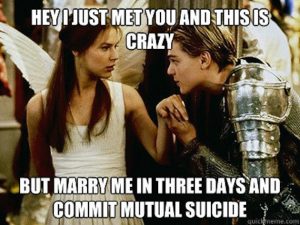
Love him or hate him, even if you haven’t read or seen his works, you’ve heard of him. What’s the big deal with the Big S, anyway? Why does everyone think he’s such a big deal, and why are his works so hard to understand?
Having taught high school English for over two decades, it always struck me how so many of my students cringed and complained at the thought of studying Shakespeare…until we actually got into it…and they realized this guy’s plays and sonnets are chock full of sex, murder and politics fit to match any Game of Thrones episode, more juvenile dirty jokes and parodies than an episode of Family Guy, and a fair share of random bizarreness (cross-dressing? statues turning into people? people turning into donkeys? revenge cannibalism? Yes, yes, yes, yes!) Yes, there’s also some super-deep stuff in there about love, friendship, betrayal, social pressures, power, regret, etc., universal enough that human beings all around the world, more than four centuries later, still find incredibly relatable.
The language can be a hurdle, though, I get it. If it helps, no one in Elizabethan England spoke the way Shakespeare’s characters did — not in fully metrical sonnets with rhyming quatrains, not with inverted word order in order to fit that meter and rhyme scheme, and not with crazy made-up words. (As far as we can tell, the first appearance of about 1,700 words in the English language is in Shakespeare texts, leading to the strong possibility that he made at least some up these up. Some of these words became so popular that we can’t imagine not having them today – ex, puppy dog, lullaby, critic, obscene, and even the name Jessica). His plays were stylized, in the same way that the characters from, say, Hamilton talk in hip-hop songs even though the real Thomas Jefferson probably never busted any mad rhymes like that.
But that’s where this podcast comes in. I’ll be your guide, helping you sift through the wondrously weird word-salads of the Bard, and all along I’ll be highlighting some of the sexy, violent, and just super-strange parts that your English teacher was probably too afraid to explain to you for fear of angry parent phone calls.
“Give me your hand, if we be friends*,” and let’s begin!
* Midsummer Night’s Dreame, V.ii. Always cite your sources, y’all.
Podcast: Play in new window | Download



